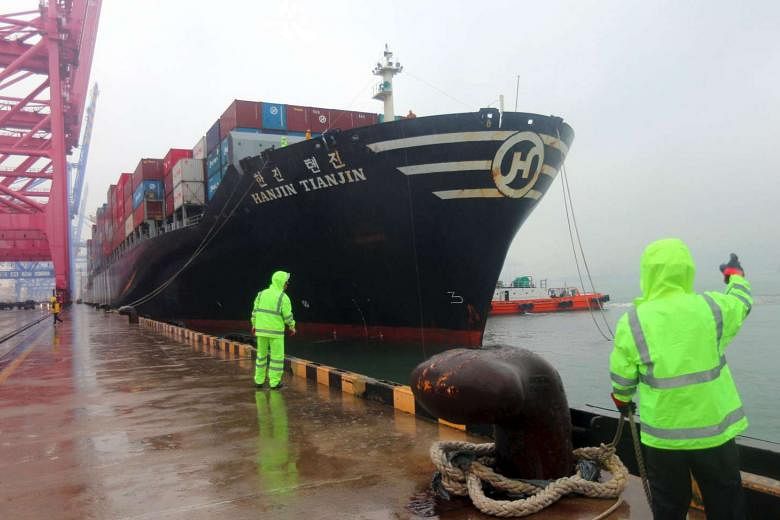SEOUL • Roughly half of Hanjin Shipping's container vessels have been blocked from ports since the South Korean firm's collapse, putting manufacturers and their customers increasingly on edge about the fate of cargo and spikes in freight costs.
Woes for the world's seventh-largest container shipper have only deepened since its banks withdrew support and it filed for court receivership this week.
One vessel has also been seized by a creditor in Singapore, while firms in the United States have launched legal action against Hanjin to seize vessels and other assets over unpaid bills.
The potential for cargo to be stranded, perhaps indefinitely, is unnerving for many, particularly as industry insiders and analysts believe that Hanjin has little chance of being rehabilitated and its assets will eventually be liquidated.
"The biggest problem is what is going to happen to cargoes at sea. We are just praying that our cargoes are not seized," said Mr Ra Kyung Moon, executive vice-president at Forman Shipping, a freight-forwarding firm in Seoul.
Freight-forwarding firms, which organise shipments, may be held liable for customer cargo that does not arrive.
They are also worried about the recovery of funds paid to Hanjin in advance for services promised.
Some manufacturers are drawing up contingency plans, while the US Retail Industry Leaders Association has called on the Department of Commerce and the Federal Maritime Commission to take action to minimise disruption.
A Hanjin spokesman said 44 of its 98 container ships had been denied access to ports including Shanghai, Sydney, Hamburg and Long Beach, California. These include instances where lashing firms have refused service, or where the port authorities have blocked entry.
But service for Hanjin ships resumed at South Korea's main ports of Busan and Incheon yesterday, after the government said the port authorities would guarantee payments for service providers.
On Thursday, a South Korean trade group said about 10 Hanjin ships were effectively seized in China. Hanjin said yesterday that the number was incorrect.
Hanjin's collapse has come during the shipping industry's busiest season ahead of the year-end holidays. Freight rates have surged.
"The cost of shipping is now jumping through the roof and carriers are filing requests for a full increase in rates from Sept 1," said Mr Paul Tsui, managing director of the Janel Group in Hong Kong, a freight-forwarding and logistics firm. He added that air freight volumes would probably rise to replace urgent orders stranded in ports or at sea.
Hanjin, which accounts for 7.8 per cent of trans-Pacific trade volume for the US market, has a global client base.
REUTERS

